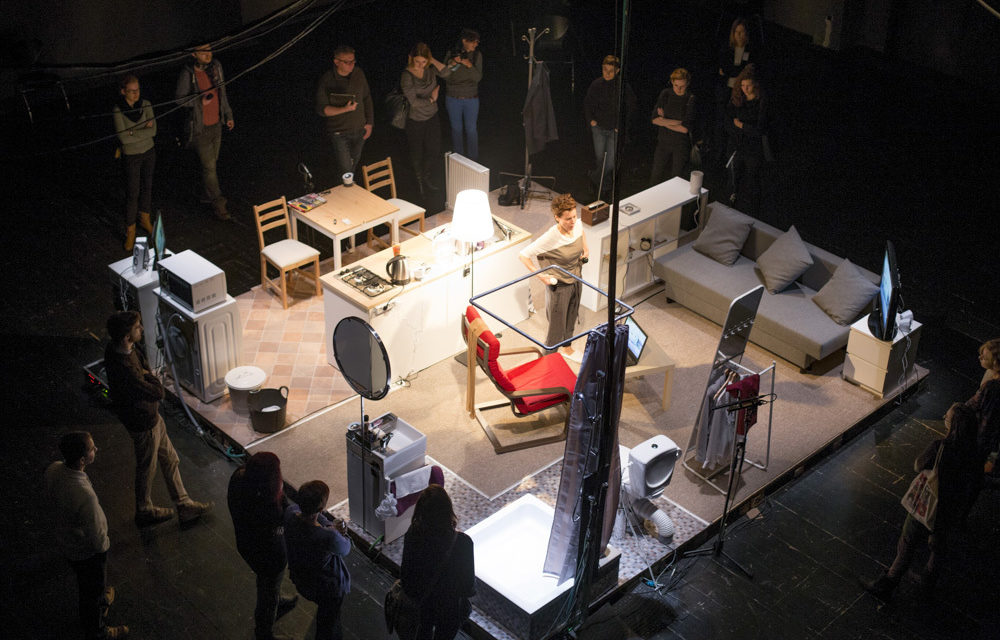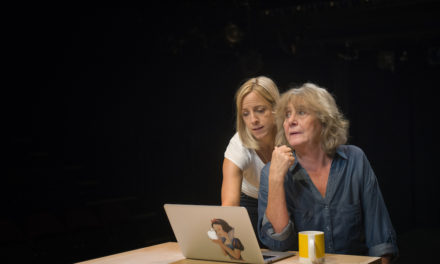It’s hard to think of a play more diabolically suited to the era of reality TV, vanished privacy and ubiquitous surveillance than Franz Xaver Kroetz’s Request Concert. It’s a play that asks whether the ultra-examined life of branded distractions, compulsive sharing, and rationalized isolation that we First World Westerners feel so lucky to lead really is worth living. That this 75-minute wordless drama dates from 1973, before the internet existed, makes it prophetic. It is certainly permanently poignant and disturbing.
Request Concert is an exercise in extreme voyeurism—a point the director Yana Ross has emphasized powerfully in her Polish production recently performed at BAM. An ordinary-looking, middle-aged woman (Danuta Stenka) returns from work to her tidy, middle-class apartment, changes her clothes, prepares and eats a frugal meal, smokes, watches TV, listens to the radio, uses the toilet, apathetically plays a video game (originally the character worked on a rug weaving), prepares for bed, tries to sleep, and finally, in the same neat and methodical manner as everything else, swallows half a box of sleeping pills.
The apartment in Ross’s version (designed by Simona Bieksaité) is a small, square island in the middle of a black-box theater where spectators can walk around, watch from any angle, and position themselves either in distant balcony seats or inches away from Stenka. They see one another watching as much as they see the dramatic action. The appliances and fixtures, all familiar contemporary European styles and brands, actually function, and other details are made recognizably local for New York. The catalogues the woman flips through are from IKEA, Costco and PC Richards, and the radio program is hosted by NPR’s Ari Shapiro. The updating is seamless, painfully accurate, and beautifully perceptive.
To watch any good production of this play is to peer closely at someone’s intimate private activities. Because there are no words (except on the radio), we inspect every nook and cranny of the hyperrealistic setting and every minute detail of the performer’s gestures and expressions for information that might help explain what’s going on. And you’d have to be pretty oblivious not to suspect what’s coming even if you haven’t been told. The familiarity of all the details, their reflection of our world, is obviously crucial information, as are the woman’s insufferably anal habits. Is her compulsiveness why she’s alone? She par-boils and peels a tomato before slicing it, refuses to bite a cracker before the surface is evenly smeared, repeatedly shines her faucets with a towel, and folds strips of toilet paper into perfect squares before wiping herself.
Everything is in its place—orderly as a shopper’s catalogue, or as the grave.
When this play first appeared in Germany it bored some observers. The same is true of its American premiere, when the actress Joan MacIntosh and director Joanne Akalaitis brilliantly reinvented the scene as 1981 Queens. The play in these early days struck some as a dramatized suicide with no explanation. People kill themselves in dramas all the time, but this playwright seemed to provide no explicit justification or explanation for it. He made his audiences seek the reasons themselves via careful and prolonged inspection of the scene. That the scene mirrored their world so closely increased the provocation.
In fact, Kroetz provided an explicit explanation in his published text. He was an avid Communist in the 1970s and his short script decries the hopelessness and dashed expectations of ill-used workers like his character. (He gives her the name Fräulein Rasch, meaning swift or rapid in German. He also says she works in a stationery factory. Ross makes her a stenographer.) Days filled with meaningless tasks render such people mute “like animals,” he adds, crushed by an emptiness they barely understand. Small wonder that they sometimes politely remove themselves from life, “involuntarily cleans[ing] the society they condemn” and thus helping to maintain “the inhuman order in which we live.”
You don’t need to know this passage or sympathize with its Marxist premise to feel this play’s anti-consumerist critique in your gut while watching a performance. The truth is, most people really aren’t up to the task of defining a larger purpose for themselves beyond their rote tasks at work and whatever prepackaged pastimes they can pluck from the great media barrage. Critics of consumerism have told us for decades that what looks like an infinite choice is actually limited choice. Our habits and imaginations are bound by what manipulative and greedy corporations want to sell us, not (as they would have us believe) by any deep consideration of our psychological and spiritual well-being.
This is all obvious, of course. Yet it’s worth reminding ourselves now and then that all the mediated hubbub around us is specifically engineered to distract us from seeing its indifference to us. That is why Kroetz’s quietly devastating play—properly reinvented for the newly trivialized moment—will continue to hit as hard as it did 35 and 40 years ago.
This article was originally published on http://www.jonathankalb.com. Reposted with permission. Read the original article.
This post was written by the author in their personal capacity.The opinions expressed in this article are the author’s own and do not reflect the view of The Theatre Times, their staff or collaborators.
This post was written by Jonathan Kalb.
The views expressed here belong to the author and do not necessarily reflect our views and opinions.


















